Abstract
Objectives:
Oral pathologists have major responsibilities in the development of forensic science. We conducted a survey to evaluate the degree of involvement of oral pathologists in forensic investigations in India and the difficulties faced by them.
Materials and Methods:
Data was collected during 2007–2009 by means of a questionnaire survey among qualified oral pathologists related to confidence in handling forensic cases, knowledge and awareness, training in forensic odontology, practical exposure to forensic cases, and difficulties faced.
Results:
A total of 120 oral pathologists responded to the questionnaire. Of these, 28% expressed confidence in handling forensic cases, 7% had been exposed to formal training in forensic odontology, and 6% had handled forensic cases earlier. Only two participants said that they were part of the forensic team in their respective cities. Forty-eight percent of the participants said that they read forensic journals regularly.
Conclusion:
Oral pathologists are generally not very confident about handling forensic cases mainly because of inadequate formal training in the field of forensic dentistry, inadequate exposure to the subject, minimal importance given to the subject in the undergraduate and postgraduate curriculum, and no practical exposure to forensic cases.
Keywords: Forensic odontology, knowledge, oral pathologists, survey
Introduction
Forensic science is primarily concerned with the application of science in court or legal proceedings. This is an interesting, challenging, and adventurous field. The demand for skilled forensic experts is rising at both the micro and macro levels. Forensic science has taken technologies from other fields and applied them to criminal investigations and a true understanding of forensic science can only be achieved with the realization that these technologies are all used for purposes that are unique to forensic sciences, namely linkage, individualization, and reconstruction. Without a proper structured forensic science education these concepts are often not fully understood and, then, forensic science cannot realize its true potential.[1,2]
Forensic odontology is a major branch of forensic science, as dental tissues are the strongest tissues in the human body and therefore their characteristics remain unchanged even after long periods of stay in extreme environments:the teeth can often survive long periods of immersion under water, burial under soil, fire, exposure to biological agents in the natural environment. Thus, the importance of dental identification is increasing year by year.[3]
However, this field is not fully developed in India, mainly due to lack of trained personnel, lack of training facilities, limited exposure to the subject, and restricted knowledge on individual system. Oral pathologists have a major responsibility in the development of this science. The updated current dental curriculum in India includes forensic odontology in the undergraduate and postgraduate syllabus and constitutes a major portion of the subject of oral pathology. We conducted a survey to evaluate the scope and limitations of oral pathologist as forensic expert.
Materials and Methods
Data was collected through a questionnaire to qualified oral pathologists in India. The survey was conducted between 2007 and 2009. Open-ended and closed-ended questions were asked relating to confidence in handling forensic cases, knowledge and awareness, training in forensic odontology, practical exposure to forensic cases, and difficulties faced [Annexure-1]. The data obtained was analyzed using SPSS software, version 15.0. Descriptive statistics were used and the results are presented as number and percentage.
Annexure - 1.
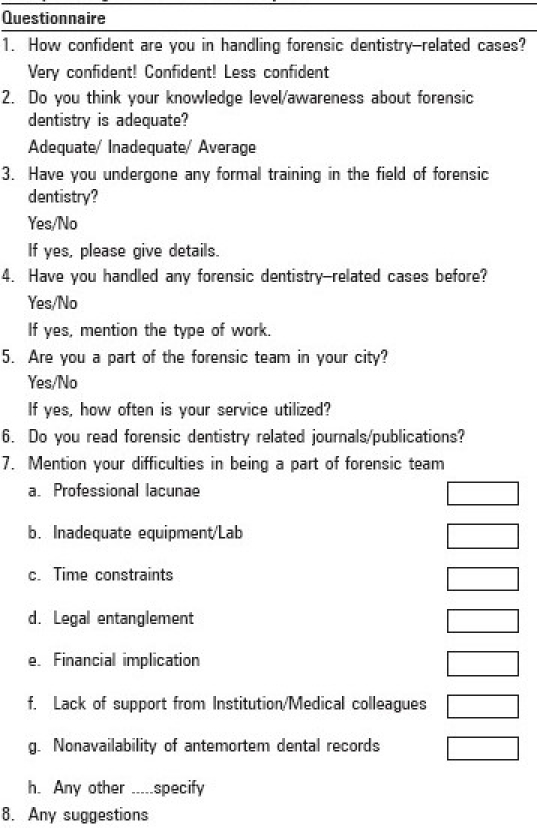
Oral pathologist as a forensic expert:
Results
A total of 120 oral pathologists responded to the questionnaire. Of these, 34 (28%) said that they were confident about handling forensic cases [Figure 1], while 84 (70%) were not very confident; 2 (2%) participants did not answer the question. Out of 120 participants, only 8 (7%) said that they were exposed to formal training in forensic odontology [Figure 2]; the other 112 (93%) had not undergone any formal training. Only seven (6%) participants said that they had handled forensic cases earlier [Figure 3], and only two (2%) participants said that they were part of the forensic team in their respective cities [Figure 4]. Interestingly, 57 (48%) participants said that they regularly read forensic journals,while 29 (25%) said that they were interested in the subject and occasionally read the journals. Thirty-two (27%) participants said that they had no interest in forensic subjects [Figure 5].
Figure 1.
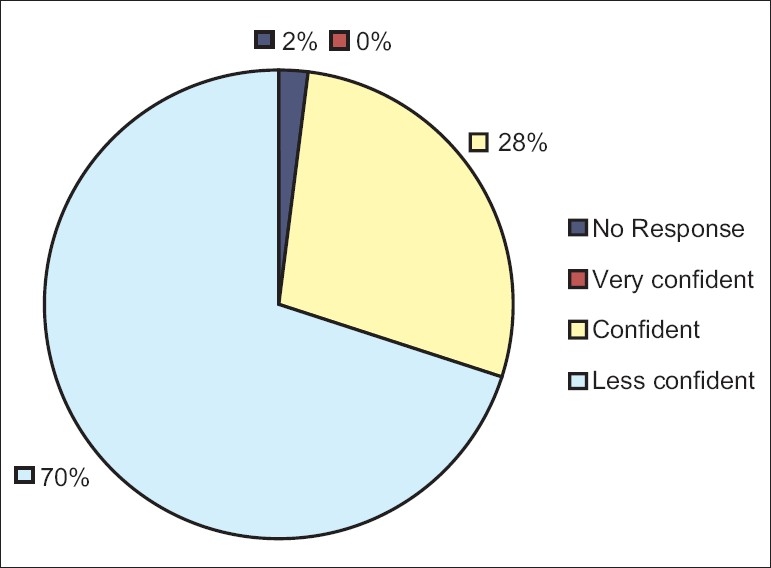
Number and percentage of oral pathologists confident of handling forensic dentistry–related cases
Figure 2.
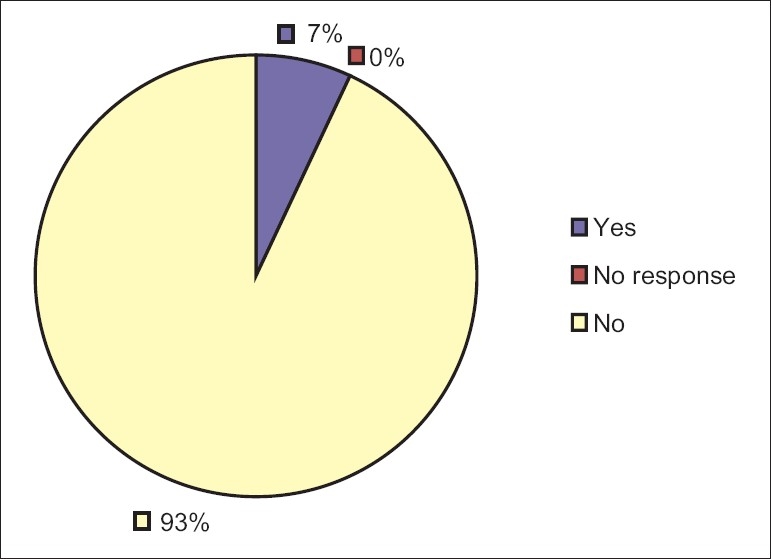
Number and percentage of oral pathologists who have undergone formal training in forensic dentistry
Figure 3.
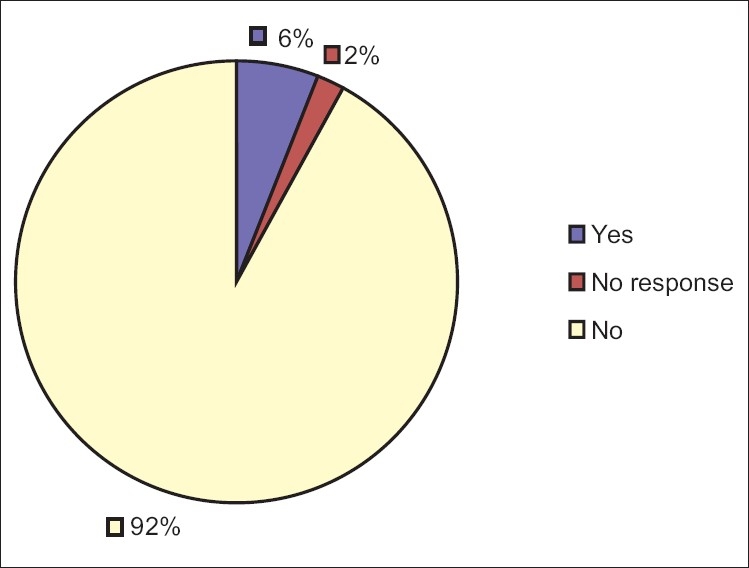
Number and percentage of oral pathologists who have participated in forensic case investigations
Figure 4.
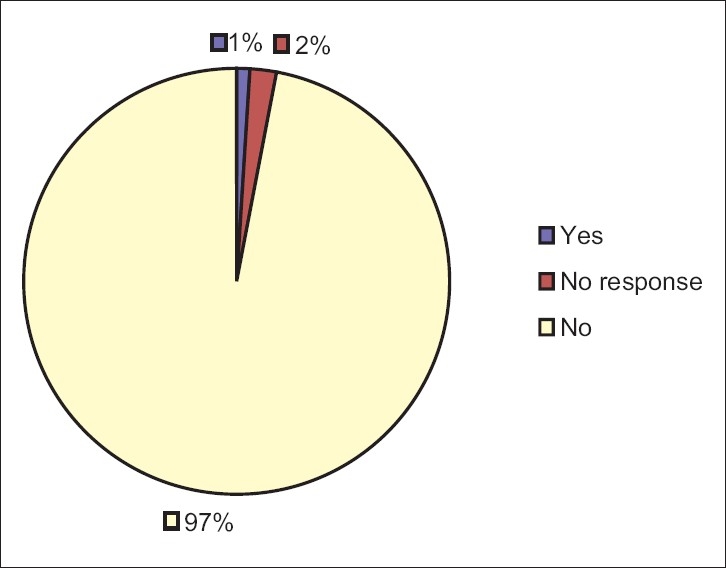
Number and percentage of oral pathologists who were part of the forensic team in their respective cities
Figure 5.
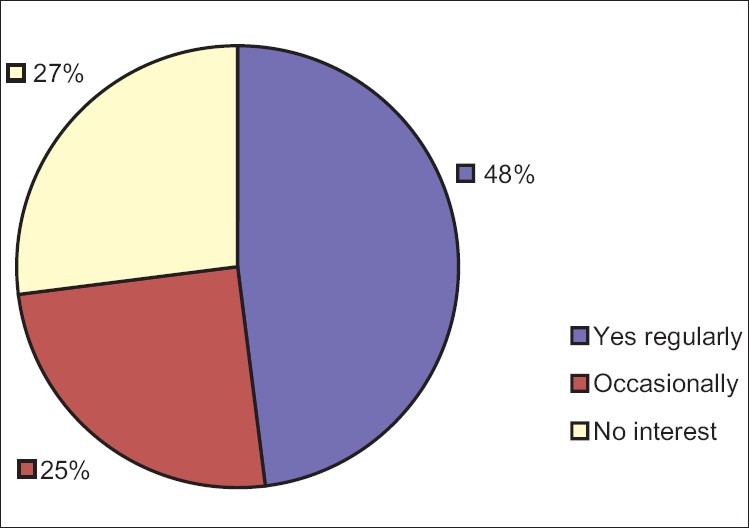
Number and percentage of oral pathologists who read forensic journals
Discussion
Forensic odontology is a developing science of great importance to society. The need for forensic experts has increased greatly over the last decades due to the unprecedented demand from the criminal justice system.[4,5] However, in India, utilization of forensic odontology in the criminal justice system is minimal.
It is vital that a person interested in forensic odontology be properly educated and trained.[6,7] Oral pathologists have a major responsibility of training forensic experts as well as handling forensic cases since they have specialized knowledge of the normal development, morphology, functions of oral tissues and the variations seen in different pathological/nonpathological states. Also, only they can understand the histological basis of various dental treatment procedures and the physiologic ageing process in the dental tissues.[8–11] However, the application of this special knowledge and skill in the field of forensics is minimal in India.
The present survey indicates that the low confidence of oral pathologists with regard to handling forensic cases is mainly because of inadequate formal training in the field of forensic dentistry, inadequate exposure to the subject, minimal importance given to the subject in the undergraduate curriculum and lack of practical exposure to forensic cases. No clear outline or format is provided in the postgraduate curriculum. Our survey revealed very few oral pathologists were part of the forensic team dealing with medico-legal cases in their respective cities [Figure 4].
The demand for accurate forensic investigation will increase the scope of this interesting science in India. On the basis of the findings of the present survey, we recommend a plan for improvement, which should be implemented in three phases.
In the first phase, the undergraduate program must be improved by including preclinical lectures on forensic odontology, followed by clinical training. There must be a detailed program to ensure exposure to forensic cases. Training in forensic medicine and other branches of forensic science should include forensic aspects of dentistry. Teachers need to be trained to teach forensic dentistry.
In the second phase, a structured postgraduate training program should be developed, with significant clinical exposure to different specialties, especially oral pathology and microbiology. The postgraduate trainee must develop adequate knowledge of proper report presentation to the police department, record keeping and archivization, criminology, legal jurisprudence, use of computers and forensic photography.
In the third phase,we recommend that postgraduate diploma course/certificate course/short-term courses be started in the specialty of forensic dentistry.
We also recommend the establishment of referral centers with well-equipped dental labs (at least at the district levels), standardization of techniques and, most importantly, improvements in record keeping (for example, have a standard check of dental records in hospitals and private clinics, issue identification numbers/allot dental or medical identification cards to patients, etc.)
For an efficient forensic investigation, we need a dental team, comprising personnel from all branches of dentistry, working in close association with experts from other branches of forensic science. The government has a social obligation to recover, identify and hand over the remains of a deceased person to the relatives and every effort must be made to achieve this. Academicians, law-enforcing authorities, statutory bodies, and government have to get together and coordinate an action plan.
Footnotes
Source of Support: Nil
Conflict of Interest: None declared
References
- 1.Quarino L, Brettell TA. Current issues in forensic science higher education. Anal Bioanal Chem. 2009;394:1987–93. doi: 10.1007/s00216-009-2598-y. [DOI] [PubMed] [Google Scholar]
- 2.Iacopino AM. The influence of “new science” on dental education: Currentconcepts, trends, and models for the future. J Dent Educ. 2007;71:450–62. [PubMed] [Google Scholar]
- 3.Phillips VM. The role of forensic dentistry in South Africa. Med Law. 1993;12:487–91. [PubMed] [Google Scholar]
- 4.Almirall JR, Furton KG. Trends in Forensic science education: Expansion and increased accountability. Anal Bio anal Chem. 2003;376:1156–9. doi: 10.1007/s00216-003-1891-4. [DOI] [PubMed] [Google Scholar]
- 5.Herschaft EE, Rasmussen RH. The teaching of forensic dentistry: A status report. J Dent Educ. 1978;42:532–6. [PubMed] [Google Scholar]
- 6.Johanson G, Drinnan AJ, Keiser-Nielsen S. Education in forensic odontology. Int Dent J. 1981;31:6–13. [PubMed] [Google Scholar]
- 7.Acharya AB. A decade of forensic odontology in India. J Forensic Dent Sci. 2010;2:1. doi: 10.4103/0974-2948.71048. [DOI] [PMC free article] [PubMed] [Google Scholar]
- 8.Katz JO, Cottone JA. The present direction of research in forensic odontology. J Forensic Sci. 1990;33:1319–27. [PubMed] [Google Scholar]
- 9.Darling MR, Daley TD. Oral Pathology in the dental curriculum: A guide on What toTeach. Dent Educ. 2006;70:355–60. [PubMed] [Google Scholar]
- 10.Rajendaran R, Sivapathsundram B. Shafer's text book of oral pathology. 5th ed. Delhi: Elsevier publication; 2005. [Google Scholar]
- 11.Brouder GT, Brock AM. Forensics as a teaching/learning strategy in graduate nursing education. J Nurs Educ. 1984;23:159–60. doi: 10.3928/0148-4834-19840401-08. [DOI] [PubMed] [Google Scholar]


